Hadar (Hoffman), Amir
Amir, son of Sarah and Moshe, was born on Yom Kippur, 10 October 1948, in the Ginegar group. His family moved to the United States and he began to study in the elementary school and soon learned the English language, and when he returned to Israel he graduated from the Smilansky elementary school in Rehovot. During his studies, Amir was active in the Scouts movement and was a trainee and instructor in the Gadna-Air Brigade. The flying world revived him and he was well versed in his history. He spent many hours preparing models and gliders and took courses in gliding. After graduating from high school, Amir was included in a Gadna-Air delegation that represented Israel in Canada, and the encounter with GDFs from different countries, the tours of the Canadian Air Force bases and the trips made in their honor made a strong impression on him. Amir was drafted into the IDF on his return to Israel in October 1966 and volunteered for the air force, and in one of his letters he wrote: “I did not write for a long time, because I just could not. We had a concentrated course in which all the tests were with a 90% passing grade. I did not fail in any examination, but I lost a few kilograms.” He held the course for thirteen months, but was unable to finish it, so he volunteered for an armored reconnaissance unit, and Amir’s career grew, he became serious, weighed things more seriously. He was looking for justice and integrity, and he wanted to stand for the weak. In 1969, Amir successfully completed a course for advanced patrol officers. Towards the graduation ceremony, he wrote to his friend: “From moment to moment, the order becomes more important to me. I begin to understand that this is a sharp change from a person who makes decisions to a person who decides decisions, moves from a person whose actions are determined to a person whose actions determine a transition from responsibility to responsibility.” During the War of Attrition, Amir was appointed commanding officer in the Suez Canal area. And was he fit to be a commander. He died in the battle on the Kuneitra junction, the village of Kfar Nesej, and he was killed on October 12, 1973. A shell hit the commanding officer of the command post near Tel Karin. The cycle of life that began on Yom Kippur with the establishment of the State ended in the Yom Kippur War. Amir was brought to the cemetery in Rehovot for burial. Survived by his parents and brother. After his fall, he was promoted to captain. His parents published a pamphlet in his memory, with excerpts from his letters, a discourse of friends and teachers, which accompanied him during his various periods of life.
